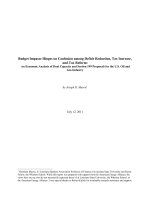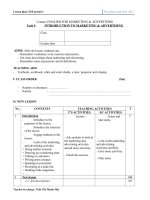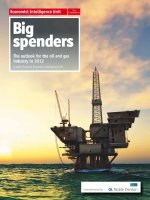English For Oil And Gas.pdf
Bạn đang xem bản rút gọn của tài liệu. Xem và tải ngay bản đầy đủ của tài liệu tại đây (6.51 MB, 254 trang )
English for
Oil and Gas
FOUNDATION COURSE
A dedicated language course for the Petrochemical Industry
English for
Oil and Gas
Foundation Course
This course is designed for oil technicians undergoing training in English
and is uniquely based on authentic technical training material. The aim of
the course is to give you all the language functions and structures you
need to work effectively and safely in an English speaking petrochemical
environment.
© Language Solutions
English for Oil and Gas - Foundation Course
Contents
Module 1
Unit
Title
1
Training Skills
7
2
Numbers and Measurement
27
3
Describing Equipment
47
Module 2
Module 1 Review
67
4
Giving Instructions
73
5
Safety
92
6
Describing Systems
114
Module 2 Review
Module 3
Page
135
7
Making Comparisons
143
8
Describing Processes
164
9
Expressing Possibility
185
Module 3 Review
206
Pair work activities
214
Tapescripts
244
Irregular Verb Chart
252
© Language Solutions
English for Oil and Gas - Foundation Course
English for
Oil and Gas
Course Syllabus – Module 1
Unit 2
Unit 1
“What does „soiled‟
Numbers and
Measurement
“What is 10 Kpa in
mean?”
pascals?”
Training Skills
Present simple: ‘to be’
Present simple:
Grammar
negatives and questions
Parts of speech
Unit 3
Describing Equipment
“What is this? What does
it do?”
Countable/uncountable
nouns
Present simple passive
How much/how many
‘Can’ expressing ability
Question forms
Identifying Equipment
Vocabulary
Areas
The English alphabet
Large numbers
Opposites
Decimal numbers
Prepositions of place
Shapes and shape
Fractions
Prepositions of
adjectives
Percentages
movement
Colours
Ordinal numbers
Oil industry Jobs
Units of measurement
Training Questions
Functional
Language
Basic personal questions
Social English: meeting
and introducing
Ranking items
Describe the use of
Measuring
workshop tools
Describing area
Describe location
Describing mass
Describe equipment
Telling the Time
Workshop tools and
usage
Technical
Language
Training Language
Calculations
Measuring devices:
Measuring pipelines
level, pressure and
Measuring pressure
temperature
Pumps
© Language Solutions
English for Oil and Gas - Foundation Course
English for
Oil and Gas
Course Syllabus – Module 2
Unit 4
Unit 5
Giving Instructions
Describing Systems
“How many components
“How does Control A
work?”
Grammar
Vocabulary
Areas
“It is a safety helmet. It
are there in the
is used for protecting
system?”
the head.”
Past simple
Imperatives
Present continuous
Zero conditional
Types of controls
Expressing advantages
Control verbs
and disadvantages
Synonyms
Adverbs of frequency
Giving warnings
Functional
Language
Unit 6
Safety
Past continuous
Parts of the body
Types of injury
Word formation
Question words
Word formation
Identifying dangerous
Describing diagrams
Identifying hazards
situations
Describing systems
Risk assessment
Hand signals
Reporting Incidents
Open and closed loop
Crane controls
Technical
Language
Control systems
Crane operations
systems
Safety signs
Alarm systems
Personal Protective
Electrical circuits
Equipment
Process and Instrument
Safety equipment
Drawings
BP 8 Golden Rules of
Flow measurement
Safety
devices
© Language Solutions
English for Oil and Gas - Foundation Course
English for
Oil and Gas
Course Syllabus – Module 3
Unit 7
Unit 8
Making Comparisons
Describing Processes
“How many steps are
there in your
description?”
“An electric drill is much
more powerful and …”
Grammar
Comparatives
Present Perfect – past
Superlatives
experience
as … as
Present Perfectunfinished past
Unit 9
Expressing Possibility
“First, Tom ought to…”
Modal verbs: obligation
advice
necessity
Passive modal verbs
Second conditional
First aid
Vocabulary
Areas
Modifying adverbs
(much, slightly)
Sequencing words
‘yet’ and ‘already’
Word formation (2)
Technical Expressions
and plain English
Sequencing events
Functional
Language
Describing objects and
Describing processes
materials
Describing past
Expressing similarities
experiences
and differences
Describing ongoing
Giving advice
Expressing prohibition
Expressing possibility
situations
States of matter
Methods of oil recovery
Oil refining and oil
Technical
Language
products
Types of engine
Qualities of metals
Temperature devices
Safe lifting procedures
Troubleshooting and
Lockouts and tagouts
fault finding
Thermostats
Driving safety
Oil separation
Tool Box Talks
techniques
Slip hazards
Pigging
© Language Solutions
English for Oil and Gas - Foundation Course
Unit 1 – Training Skills
-7
-
Unit 1
Training Skills
What does
„soiled‟ mean?
„Soiled‟ means
„dirty‟.
© Language Solutions
English for Oil and Gas - Foundation Course
Unit 1 – Training Skills
-8
-
Training Skills - Unit Map
The aim of this unit is to introduce the language of training and give an introduction to
social English, the English you will use to communicate with colleagues. By the end of
this unit you will be able to:
use the language of the training room
introduce yourself and ask questions about personal information
identify basic objects
identify and describe shapes
identify parts of speech
Complete the tables when you finish the unit.
I can
Difficult
Okay
Easy
Difficult
Okay
Easy
ask training questions
say the alphabet
identify basic objects
identify shapes and use shape adjectives
give person information
explain some oil industry jobs
identify colours
I understand
the unit grammar: use „to be‟
use present simple
the unit vocabulary (see word list)
If there is anything you are not sure of ask you trainer to revise the material.
© Language Solutions
English for Oil and Gas - Foundation Course
Unit 1 – Training Skills
-9
-
Personal Information
Read the text and look at the verbs in bold. Complete the table. ( 1.1)
My name is Alan. I am 46 years old. I am a
technical trainer. I am married. My wife‟s name
is Anna. We have two children. My son is 22 and
my daughter is 19. They are students. I am
from Scotland. Anna is not from Scotland. She is
from England. Are you married?
Positive
Negative
Question
I
…………
…………
…………
He/She/It
…………
…………
…………
You/We/They
…………
…………
…………
Complete the text below. ( 1.2)
My name ………… Bob. I ………… 32 years
old. I ………… married. My wife‟s name
………… Helen. We have a son. His name
………… Mike. He is 9 years old. I ………… a
technical trainer, I ………… a technical trainee.
Now, write a paragraph about you and your family. Tell a partner.
© Language Solutions
English for Oil and Gas - Foundation Course
Unit 1 – Training Skills
- 10
-
How Are You?
There are five mistakes in the dialogue below. Correct the mistakes and practise the
conversation with in a group. Bob introduces Mike to Dave at a party. ( 1.3)
Bob: Hi, Dave.
Dave: Good night Bob. How are you?
Bob: Thanks. And you?
Dave: I very well, thanks.
Bob: Do you know Mike?
Dave: No, I do.
Bob: Dave, this is Mike. Mike, this is Dave.
Mike: Please to meet you.
Dave: Pleased to meet you too.
The expressions in the box are all possible answers to the question: How are you? Put
them in the correct column.
Excellent
Not so bad
Alright
Can‟t complain
Fine
Okay
Very well
Awful
Terrible
Wonderful
So-so
Not so good
50-50
Marvellous
Surviving
© Language Solutions
English for Oil and Gas - Foundation Course
Unit 1 – Training Skills
- 11
-
Training Skills
If you don’t understand something in your training - ask.
What do you say if: ( 1.4)
a) your trainer speaks too quickly.
please / could / speak / you / slowly / more
……………………………………………..
b) your trainer is difficult to understand
clearly / speak / more / please / you / could
……………………………………………..
c) your trainer speaks too quietly.
loudly / speak / please / more / you / could
……………………………………………..
d) you did not hear what your trainer said.
repeat / could / you / please / that
……………………………………………..
e) you did not understand what your
trainer said.
understand / sorry / don‟t / I
……………………………………………..
f) you do not understand a word your
trainer said.
mean / does / what / „extinguish‟
……………………………………………..
g) you want to know the spelling of a
word.
„extinguish‟ / spell / you / do / how
……………………………………………..
g) you do not know something
know / sorry / I / don‟t
……………………………………………..
Check the meaning of the following words with a partner
„Soiled‟ means
dirty.
What does
„soiled‟ mean?
a) compress
b) flame
c) monitor
d) periodic
e) flexible
f) risk
g) inhale
h) ring
l) expand
© Language Solutions
English for Oil and Gas - Foundation Course
Unit 1 – Training Skills
- 12
-
Identifying Equipment
Work with a partner and identify the equipment and devices below.
What is
that?
That is a
chainsaw
© Language Solutions
English for Oil and Gas - Foundation Course
Unit 1 – Training Skills
- 13
-
The Alphabet
Letters in the English alphabet use certain sounds. Look at the table below and group the
letters in the appropriate phonetic column.
A
N
Play
B
O
C
P
D
Q
E
R
See
F
S
Left
G
T
H
U
Eye
I
V
J
W
Know
K
X
Are
L
Y
M
Z
You
Now, practise spelling the equipment on the previous page with a partner.
What is
that? How do you
spell it?
That is a
pig. P – I - G
Some of the words below contain spelling mistakes. Rewrite the words with mistakes.
Check your answers with a partner.
1) instruement -
……………………
2) platform -
……………………
3) beautiful -
……………………
4) fourteen -
……………………
5) fourty -
……………………
6) daughter -
……………………
7) objecktive -
……………………
8) question -
……………………
9) mechanic -
……………………
10) traine -
……………………
© Language Solutions
English for Oil and Gas - Foundation Course
Unit 1 – Training Skills
- 14
-
Building English
Every word is a part of speech and has a special name.
Nouns = names
Verbs = actions
Adjectives = describing words
Put the words in the box in the correct column
exact
consider
safe
equipment
tired
pipeline
trainee
examine
initial
learn
job
calculate
difficult
course
remember
Noun
Verb
Adjective
………………………….
………………………….
………………………….
………………………….
………………………….
………………………….
………………………….
………………………….
………………………….
………………………….
………………………….
………………………….
………………………….
………………………….
………………………….
We also use:
Articles: a, an, the
Prepositions: in, on, at, to, from, …
Conjunctions: and, but, so, …
Adverbs: well, quickly, almost, …
A standard sentence in English has the following form:
Bob
subject
+
likes
verb
+
his job
object
Ω
Adjectives usually come before the noun:
a complex machine
an interesting problem
a difficult question
an exact figure
Look at the sentences in italics on this page and identify the parts of speech. Check your
ideas with a partner.
© Language Solutions
English for Oil and Gas - Foundation Course
Unit 1 – Training Skills
- 15
-
Opposites
Many adjectives and verbs have opposites. Match the words in the box with
the pictures
smooth
deep
accurate
flexible
shallow
expand
approximate
rigid
contract
rough
1) …………………
2) …………………
3) …………………
4) …………………
What time
is it?
About
one.
What time
is it
5) …………………
12:58
6) …………………
Rubber
Steel
7) …………………
8) …………………
9) …………………
10) …………………
What is the
opposite of
„flexible‟?
The opposite of
„flexible‟ is
„rigid‟?
© Language Solutions
English for Oil and Gas - Foundation Course
Unit 1 – Training Skills
- 16
-
Choose the correct word to complete the sentences.
1) Iron is a …………………… material.
rigid / flexible
2) When you heat metal it ……………………
expands / contracts
3) It is important to be …………………… when
measuring.
approximate / accurate
4) A 20 meter well is …………………
deep / shallow
5) Glass is ……………………
smooth / rough
Now, write five example sentences using the words you did not use.
1) ………………………………………………………………………………………
2) ………………………………………………………………………………………
3) ………………………………………………………………………………………
4) ………………………………………………………………………………………
5) ………………………………………………………………………………………
Test your partner: Do they know all the opposites? Work together and complete the table.
a) good
……………………
b) complex
……………………
c) fast
……………………
d) dry
……………………
e) long
……………………
f) dirty
……………………
g) happy
……………………
h) heavy
……………………
i) early
……………………
j) dark
……………………
k) careful
……………………
l) dangerous
……………………
m) hot
……………………
n) loud
……………………
o) cool
……………………
p) wrong
……………………
q) big
……………………
r) flammable
……………………
s) difficult
……………………
t) fragile
……………………
© Language Solutions
English for Oil and Gas - Foundation Course
Unit 1 – Training Skills
- 17
-
Training Language
Find the words in the word search below
1. aim
2. provide
3. practical
4. theoretical
5. principle
6. device
7. associated
8. identify
9. consider
10. objective
11. knowledge
12. principal
13. delegate
14. definition
15. instrumentation
A
M
I
N
S
T
R
U
M
E
N
T
A
T
I
O
N
N
R
T
Y
Z
P
R
A
C
T
I
C
A
L
B
D
K
Z
S
T
H
E
S
R
A
L
X
P
R
O
V
I
D
E
N
Q
A
D
E
G
E
I
I
Y
B
P
P
N
C
S
O
S
O
X
S
S
O
B
A
N
D
F
H
A
W
S
E
L
B
B
W
N
S
P W C
R E T
I K L
N E R
C I P
I B T
P N W
A I M
L W B
E N T
I D E
A I N
R N H
J E C
N Z T
L E D
A H L
O C I
V
I
D
E
L
E
G
A
T
E
R
D
P
T
S
G
L
A
G
C
Q
U
E
H
J
E
N
M
M
B
Q
I
L
E
Y
T
L K
A L
D W
E I
F D
I E
N N
T T
I
I
O F
N Y
D C
E F
V E
I R
C R
E N
E D
Now, match the definitions to the words above.
a. A synonym for „think‟ - …………………
b. Someone who goes to a course - …………………
c. A synonym for „give‟ - …………………
d. Two words which mean „machine‟ or „equipment‟ - ………………… and
…………………
e. Two synonyms for „target‟ - ………………… and …………………
f. An explanation of the word is a - …………………
Choose the correct word to complete the text below. ( 1.5)
Bob is a mechanical engineer. He finished university in the summer but he doesn‟t have a
job. He has a theoretical / objective understanding of mechanics and he can consider /
identify all the instrumentation / device and equipment used in mechanical engineering
but he has very little principle / practical experience.
© Language Solutions
English for Oil and Gas - Foundation Course
Unit 1 – Training Skills
- 18
-
Shapes and sizes
Shape
Noun
Adjective
…………………………
…………………………
…………………………
…………………………
…………………………
…………………………
…………………………
…………………………
…………………………
…………………………
………………………….
………………………….
…………………………
…………………………
…………………………
…………………………
How many things can you see in the room that are:
1.
2.
3.
4.
circular? ………………..
triangular? ………………..
rectangular? ………………..
square? ………………..
© Language Solutions
English for Oil and Gas - Foundation Course
Unit 1 – Training Skills
- 19
-
Shape Adjectives
Write the opposites
Big
…………
wide
deep
………….
long
………….
high
………….
thick
………….
………….
Use the adjectives and the nouns at the bottom of the page to describe the pictures
1) …………………….
2) …………………….
3) …………………….
4) …………………….
5) …………………….
6) …………………….
7) …………………….
explosion
pipe
9) …………………….
8) …………………….
hole
pressure
10) …………………….
© Language Solutions
English for Oil and Gas - Foundation Course
ring
Unit 1 – Training Skills
- 20
-
Colours
Solve the anagrams to identify the colours.
a) edr
……………………
b) theiw
……………………
c) kaclb
……………………
d) rpluep
……………………
e) genre
……………………
f) nrbow
……………………
g) weylol
……………………
h) kipn
……………………
i) ubel
……………………
j) yagr
……………………
Work with a partner to complete the lists as quickly as possible.
Name 10 things that are naturally …
… red
… blue
… yellow
… green
…………………… ……………………
……………………
……………………
…………………… ……………………
……………………
……………………
…………………… ……………………
……………………
……………………
…………………… ……………………
……………………
……………………
…………………… ……………………
……………………
……………………
…………………… ……………………
……………………
……………………
…………………… ……………………
……………………
……………………
…………………… ……………………
……………………
……………………
…………………… ……………………
……………………
……………………
…………………… ……………………
……………………
……………………
Use the key to complete the sentences and the diagram.
The red wire connects
terminal A to terminal B.
Key:
A
…
Red
The brown wire connects
terminal A to terminal ….
The ……. wire connects
terminal B to terminal D.
Brown
…
…
The blue wire connects
terminal C to terminal D.
© Language Solutions
English for Oil and Gas - Foundation Course
Green
Blue
Unit 1 – Training Skills
- 21
-
What is the Question?
Write the questions for the following answers and then practise with a partner. ( 1.6)
………………………………………………………
……………………………………………………..?
………………………………………………………
……………………………………………………..?
………………………………………………………
……………………………………………………..?
………………………………………………………
……………………………………………………..?
………………………………………………………
……………………………………………………..?
………………………………………………………
……………………………………………………..?
………………………………………………………
……………………………………………………..?
………………………………………………………
……………………………………………………..?
………………………………………………………
……………………………………………………..?
My name
is Bob.
I‟m 32
years old.
Yes, I‟m
married.
Her name
is Helen.
Yes, we have
two children.
Paul and
Emma.
I live in
Aberdeen.
I‟m a trainee
operator.
I‟m very
well, thanks.
© Language Solutions
English for Oil and Gas - Foundation Course
Unit 1 – Training Skills
- 22
-
Complete the table.
Subject
Possessive adjective
I
………
You
…Your…
He
………
She
………
It
………
We
………
They
………
You
……….
Write the correct form of the verbs.
be
have
like
work
I
……………
……………
……………
……………
You
……………
……………
……………
……………
He/She/It
……………
……………
……………
……………
We/They/You
……………
……………
……………
……………
Now, use your partner‟s answers from the previous exercise and write a paragraph about
him / her.
………………………………………………………………………………………………
………………………………………………………………………………………………
………………………………………………………………………………………………
………………………………………………………………………………………………
………………………………………………………………………………………………
Tell the group about you and your partner.
Our names are Bob and Alan.
I am 32 and he is 46…
© Language Solutions
English for Oil and Gas - Foundation Course
Unit 1 – Training Skills
- 23
-
Negatives and Questions
„Do‟ is an auxiliary verb – it is used to help the main verb of a sentence in negative
sentences and questions.
I like my job
I don’t like my job
Do I like my job?
She likes her job.
She doesn‟t like her job.
Does she like her job?
Complete the following sentences using the verb given at the end
3.5 multiplied by 7 …equals… 23.5.
1)
(equal)
…………… 3.5 multiplied by 7 …………… 24.5?
3.5 multiplied by 7 ………………………… 24.5.
…………… a derrickman …………… underwater?
2)
(work)
A derrickman ……………………………… underwater.
A derrickman ……………………………… at the top of derrick.
A hexagon ………………………… seven corners.
3)
(have)
A hexagon ………………………… six corners.
…………… a hexagon …………… six corners?
Crude oil ………………………… water.
4)
(contain)
Crude oil ………………………… gold.
What …………… crude oil ……………?
Bob usually ………………………… lunch at 13:00
5)
(eat)
Bob ………………………… lunch at 8:00.
When …………… Bob usually …………… lunch?
A manual drill ………………………… electricity.
6)
(use)
…………… a manual drill …………… electricity?
A manual drill ………………………… physical energy.
Sentences that use „be‟ don‟t use „do‟
He isn‟t a driller.
Is he a driller?
He don‟t be a driller?
Do he be a driller?
© Language Solutions
English for Oil and Gas - Foundation Course
Unit 1 – Training Skills
- 24
-
Oil Industry Jobs
What do the words in the box mean?
seismic
deposit
derrick
assist
control
maintain
stem
operate
crew
handle
Match the jobs with the definitions. Put the verbs in the correct form. ( 1.7)
A derrick monkey
………… on the seismic crew
(work)
Divers
………… rocks to find oil deposits
(study)
A doodlebugger
………… the bottom of the drill stem
(handle)
Drillers
………… the driller
(assist)
A floorrman
………… at the top of the derrick
(work)
A jughustler
………… the drilling engine
(control)
A metallurgist
………… the mud systems
(maintain)
Motormen
………… underwater
(work)
A mudman
………… routine cleaning and maintenance
(do)
An roughneck
………… the drilling machinery
(operate)
Roustabouts
………… geophones in the seismic crew
(use)
Look at the picture of a bottle-type submersible platform below. Label the picture with
the some of the jobs to indicate where the people work.
A mudman
maintains the
mud systems.
What does a
mudman do?
Where does a
floorman
work?
A floorman
works here.
© Language Solutions
English for Oil and Gas - Foundation Course
Unit 1 – Training Skills
- 25
-
Types of Rig
Read the information and identify the types of rig shown in the picture.
There are many varieties of drilling rig suitable for different conditions. To decide what
kind of rig to use you have to think about different factors. An important factor in
offshore drilling is the ocean depth.
Fixed Platform: this kind of rig is suitable for deeper waters (usually 50-300 feet). It is a
permanent structure with the drilling rig installed on an underwater jacket (steel
structure).
Barge Type: this kind of rig is a flat bottomed barge, suitable for shallow waters. The
derrick is over a moon pool in the centre of the barge.
Semi-submersible: this kind of rig is suitable for deep water operations (usually 2001,500 feet). The rig is supported by floating pontoons submerged under the water.
Tension Leg Platform: this kind of rig is similar to a semi-submersible rig but it is
attached to the ocean floor by tensioned steel cables.
Jack up: this kind of rig is suitable for shallow to medium waters. It has supporting legs
that can be raised, or „jacked up‟, when it moves to another location.
a) …………….
b) …………….
c) …………….
d) …………….
© Language Solutions
English for Oil and Gas - Foundation Course
e) …………….









